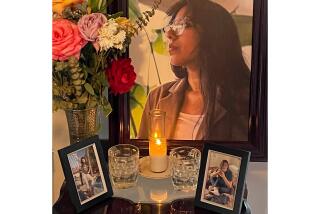Daughter Finds Solace in Murdered Father’s Music
AUSTIN, Texas — Joanna Vandiver popped the tape into the VCR and waited for the image and sound of a stout, bearded man with a guitar to glow from her television set.
“This is ‘Country Girl,’ one of his best songs,” Vandiver said, her matter-of-fact expression easing into a slight smile.
For a moment, the video bridged 20 years, the time separating Joanna from her murdered father, Texas bluesman John Vandiver.
For years after her father’s 1985 death, Joanna blotted him out of her mind, remembering him, if at all, through a teenager’s grief and anger. John Vandiver was killed execution-style by four men because they knew that besides singing, he dealt drugs and kept large sums of money around the house.
“I was mad at him for getting killed,” she said. “I blamed him when I started to smoke cigarettes and other stuff and started drinking.”
In recent years, Joanna, 35, got back in touch with some of her father’s musician friends, who told stories about a complex man -- funny, alternately intimidating and warm, intense but relaxed, commanding on stage.
She kept old tapes of one of his shows in Dallas, and last year she put them on a CD, “I Found a Dream,” so people might remember her father not as a drug dealer but as a blues-folk singer and guitarist.
Now, for Joanna, promoting her father’s legacy has become a full-time job.
*
For a time in the 1980s, John Vandiver was a big deal in Texas music circles, playing nightclubs in Dallas and Houston and sharing stages with Jerry Jeff Walker and Ray Wylie Hubbard, once even opening a Houston show for reggae superstar Bob Marley.
Vandiver was a crowd favorite, thumping his guitar while booming out blues standards, Dylan covers and occasionally his own songs.
He challenged rowdy crowds by picking a quiet song on his acoustic guitar until the audience and even the bartenders got quiet.
“He could play these beautiful and tragic Lonnie Johnson songs and turn around and be funny on the next one,” said Hubbard, part of the progressive country vanguard of the 1970s. “No matter who he opened for, he always got an encore.”
Dana Cooper sang and played with Vandiver and is now a songwriter and recording artist in Nashville. He said Vandiver was an accomplished guitarist who sang “like a white Ray Charles.”
“He had a presence and a power about him,” Cooper said. “I’d never seen anyone locally that sang with that much soul.”
Friends described Vandiver as alternately imposing in his burly build and intense glare, or laid-back with an easy laugh and dry sense of humor.
They said he spent countless hours practicing guitar riffs and showing them to other musicians, learning new techniques at an age when other musicians were either coasting on old tricks or getting “real” jobs outside music performance. That devotion made his lack of effort to escape the club circuit more puzzling.
“For a while, he carried a demo tape and a press kit around in his trunk, but I don’t know if he ever showed them to anyone,” Cooper said. “I was always mystified he hadn’t gotten a recording deal somewhere. I just assumed he wanted to be that way.”
Michael Coghlan, who met Vandiver when both were music-loving teenagers in Dallas, said Vandiver never worried about fame; he just wanted to play music.
“He told me that when he turned 50, he would be playing 10-finger Delta blues on college campuses,” Coghlan said.
Joanna Vandiver, however, has a different take on her father’s lack of ambition. She believes that it was partly because he didn’t need the money -- he was making plenty selling drugs.
*
Vandiver, who had divorced Joanna’s mother in the 1970s, lived with his girlfriend and booking agent, Debra Lynne Davis, in a cabin near Magnolia, 40 miles northwest of Houston. He lived simply, splurging only on an old sports car and a few horses for Davis. The utilities were in her name, and Coghlan said he registered Vandiver’s truck so it could be insured -- Vandiver didn’t even have a Social Security card and never filed a tax return.
Vandiver was a prodigious smoker of marijuana, which he celebrated in a song, “Against the Law.” Friends knew that he sold on the side. Somewhere along the way, he started selling cocaine, which was more lucrative.
Some friends said he sold drugs to raise money so Davis could be treated for breast cancer. Nobody seemed alarmed. Coghlan said Vandiver used to say he was an outlaw but not a criminal. “That’s what got him killed,” he said.
Vandiver, 39, and Davis, 32, were murdered during a late-night robbery in their home by four men, including Thomas Smith Mathes III, a former roommate who knew of Vandiver’s stash of cash.
Vandiver and Davis were each shot several times, and Davis’ throat was slashed. Police believe that the killers stole $40,000. Officers investigating the crime found 60 pounds of marijuana, 238 grams of cocaine and $13,000 cash in Vandiver’s home.
Mathes, now 50, was convicted of Davis’ murder along with Dennis Deria Holland Jr., 43; Cecil Covington Jr., 51; and Joseph Brian Makosky, 40. All are eligible for parole this year.
Joanna, married and the mother of a 10-year-old son, said she will fight the release. She has asked prosecutors to try the men for her father’s killing; they were convicted only in the murder of Davis.
Her other pursuit is keeping her father’s music alive.
A few days after the killings, Joanna and her mother went to Vandiver’s home and cleared out his belongings. Among the items they found were tapes of a 1984 performance at Poor David’s Pub in Dallas, which Joanna transformed into a CD.
“He didn’t leave me anything else,” said Joanna, noting that the CD would allow others to hear her father’s music and maybe make her some money.
More to Read
The biggest entertainment stories
Get our big stories about Hollywood, film, television, music, arts, culture and more right in your inbox as soon as they publish.
You may occasionally receive promotional content from the Los Angeles Times.









